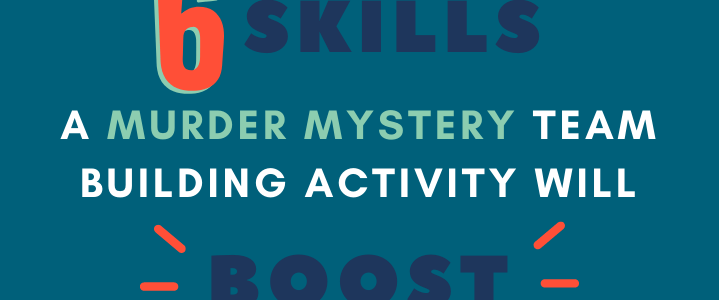6 key skills you need to create a robust team

We’ve all heard the phrase ‘team building’, and to some employees (and managers!) the words fill them with dread. These activities have become synonymous with raft building, spaghetti tower construction and generally going on a bit of a ‘jolly’. Also, feeling slightly uncomfortable with each other while you work your way through the task…
At the World of Learning back in 2019 we talked about why the positive impact of team building should not be underestimated. We spoke about how valuable team building learning objectives can be. More specifically, we looked at the wider benefits achieved by taking the time out strengthen and create a robust, efficient and cohesive team.
But how can we achieve this through team building activities? We deliver unique murder mystery challenges, and using our Murder in the Boardroom (where teams are tasked with interviewing suspects and investigating a crime scene in order to solve the mystery) as an example, we can now share the list of the 6 key skills we look out for in a team!
Observation
In the initial phase, observing the interactions between the characters to pick up on non-verbal clues is essential. This is where the information gathering starts, and you can’t solve a problem without all of the facts.
Active listening
Gathering specific facts through interrogation or interview of the characters is crucial. Don’t just passively hear the answers – fully concentrate on what’s being said and respond with open questions; you’ll discover a whole lot more!
Analytical thinking
All that information is not much use unless you can successfully collate and analyse it. Focusing on facts and evidence helps to eliminate the red herrings and extract key information; logically analysing will help see the wood for the trees.
Lateral thinking
An indirect and creative approach will bring up some fascinating solutions. Don’t go for the stereotypical ideas; keep an open mind. Try to avoid passing judgement until you’ve got all the evidence in front of you and you’ll create some fantastic scenarios.
Communication
Information will be coming from all angles, and the only way to keep it clear and concise is to communicate openly and effectively within the team. Share information, and make sure you recognise and listen to the contributions of other members. Leave no stone unturned…
Collaboration
The last step is to come up with a solution based on the evidence. Functioning effectively as part of a team by agreeing on a plan of action, working hard to fulfil their obligations and giving recognition and respect to one another makes for a strong and effective team.
So, does it work? During our seminar we’ll be looking into the case study of one particular client, an experiential design company who was experiencing discord between their finance and production departments. Following a successful team building activity, they enjoyed the benefits of increased efficiency and therefore profitability.
So, should we view team building as a dreaded chore to tick a CPD box or should it be fun, engaging, and profitable? We think we know!

